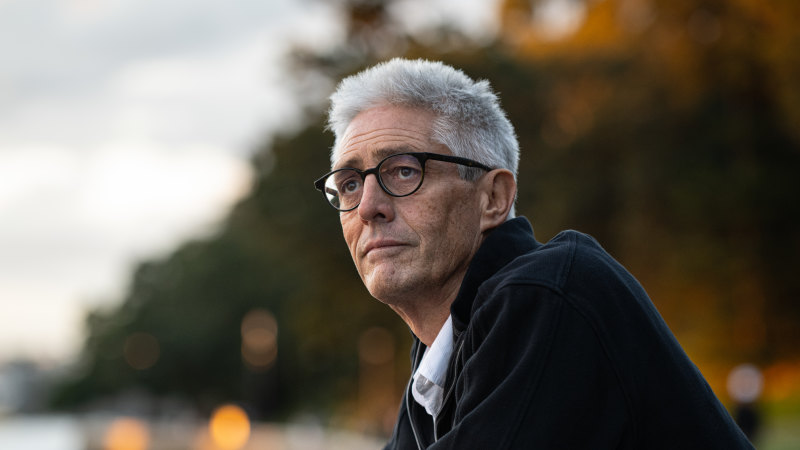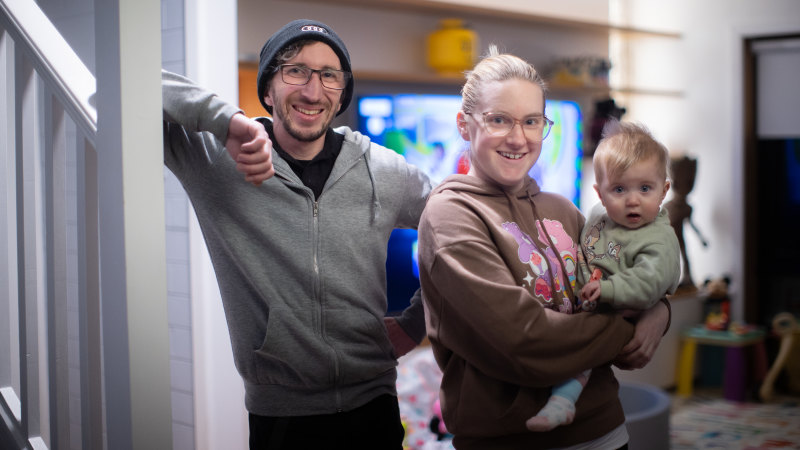Save articles for later
Add articles to your saved list and come back to them any time.
On Chris Jones’ first day as the senior doctor at Australia’s Nauru offshore processing centre, his manager warned he faced a choice between “chicken or fish” options.
The warning referred to the meals offered on the flight back to Australia, but it really meant Jones had two ways he could conduct himself.
On one hand, he could toe the Australian Border Force line and keep all his patients on Nauru, whatever their illnesses. In that case, Jones says, he could continue collecting a generous salary and the gratitude of the governments of Nauru and Australia.
Alternatively, he could act in what he came to see as the best interests of his patients – the asylum seekers and refugees in Australia’s offshore processing system.
In many cases, this was to transfer them to Australia for proper treatment. That option risked putting Jones himself on an early flight home, choosing between chicken and fish.
Just over three weeks after arriving on Nauru, Jones was on that flight when the Nauru government suddenly revoked his visa. The senior site manager told him that if no plane had been scheduled to leave the following morning, he would have found himself in detention.
Nauru hospital’s buildings.Credit: Chris Jones
His push to medevac patients to Australia made Border Force officers on Nauru “quite hostile”, he said, and upset politicians in both countries.
A spokesperson for the Home Affairs Department told this masthead that the policy of Operation Sovereign Borders was, and remains, that medical transfers off the island are approved by the government of Nauru’s Overseas Medical Referral Committee, and a representative of Home Affairs.
But Jones was given the clear message, as recorded in the daily diary he kept at the time, that “Nauru does not want to see an exodus of detainees, for whom the Australian government pays very handsomely”.
This masthead’s Home Truths investigation with 60 Minutes has revealed that Home Affairs contracts, worth billions of dollars to run Australia’s offshore detention regime on Nauru and in Papua New Guinea, were marred by suspect payments to entities linked to senior Nauruan politicians.
Jones, who has never spoken out before for fear of breaching his employment contract, says now that this gave the Nauruans an incentive to keep as many suffering people on the island as they could.
“Corruption and politics and business run hand in hand. So deep pockets need to be filled,” he said.
‘A single act of compassion’
For three weeks in August 2018, Jones, a Queensland-based family doctor, was the most senior medico on the tiny Pacific island holding hundreds of Australia’s immigration detainees. It was a time when psychological and physical distress was escalating, particularly among the children. Medecin Sans Frontieres reported that children were suffering from the rare and potentially fatal “resignation syndrome”.
Former Nauru Regional Processing Centre doctor, Chris Jones. Credit: Wolter Peeters
The Australian government was trenchantly resisting any attempt to bring people out. The then home affairs minister, Peter Dutton, argued that “a single act of compassion” could be enough for people smuggling to begin again, and prime minister Scott Morrison said transfers ran the risk of “inviting more people to risk their lives at sea”. It was the precursor of the following year’s medevac debate.
Jones says that after his arrival on Nauru on August 5, 2018, many of the children aged 11, 12 and 13 he was treating had been detained for five years. Their every moment – showers, meal times, movements – was timed and monitored by Australian contractors in ways they say were humiliating and debilitating. All were called by their boat number, not their name – a policy he denounces as dehumanising.
Among Jones’ patients were a 12-year-old girl refusing food and fluids; two brothers aged 11 and 13 who were hospitalised after swallowing washing powder; and an 11-year-old girl who had poured a can of petrol over her head and then sat toying with a lighter. Her father was eventually able to remove it from her.
Wrecked cars on Nauru, which remained poverty stricken in 2018 despite the billions Australia spent there.Credit: Chris Jones
“One child I saw, the only time he’d get up would be to have a bowel motion. Otherwise, he just wet the bed if he needed to go,” Jones says.
Once the situation became clear to him, Jones wrote to his boss that unless there was a change in policy he would quit because “he could not bear the responsibility” of a child dying on his watch.
He copied the message to his local MP, the former Liberal member for Fadden, Stuart Robert. Jones recorded Robert’s response in his diary: that because he was an original signatory of Operation Sovereign Borders he would not support refugee or asylum seekers gaining access to Australia.
The patient who stuck most in Jones’ mind was a 13-year-old Lebanese boy who was on hunger strike. The boy had abdominal pain and blood in the urine, but it was his mental distress that most troubled Jones.
The options for treatment of serious conditions at the time were for Border Force to agree to send patients to hospitals in either Taiwan or Papua New Guinea, then, once they were stable, to return them to Nauru.
“Their remit was that nobody would be allowed to go to Australia,” Jones says. They feared that “civil rights lawyers and humanitarians” would gain access to them and prevent their return to Nauru.
The Home Affairs statement said that “decisions on location of treatment were guided by clinical advice … on a case-by-case basis according to clinical need”.
But the doctor said he spent an hour and a half in the boy’s room with his mother and his brother trying to persuade him to go to Taiwan while the boy “just laid curled up in the corner on the floor saying he’s not going – he’d rather die than be transferred”.
The arm of a mother on Nauru whose child had been transferred to Australia. She believed she would never see him again.Credit: Chris Jones
After considerable wrangling, Jones got the boy to Brisbane with his older brother as his guardian. The response from the site manager, his bosses and the Australian Border Force officials was, he wrote, “quite hostile”.
“I wasn’t there to try to get everyone off [the island]; I was trying to look after them,” Jones insists. “I thought that Nauru wasn’t the right place to be treated and [it was] not the right sort of treatment they were getting.”
Afterwards, when Jones went to see the boys’ mother, she believed she would never see her sons again. She was planning her own suicide.
She “is wearing a long-sleeved blouse,” Jones wrote in his diary, “but I noticed words written on her forearm and hand when she stretched over to pour some tea. They are desperate words of fear … she wants people to be able to read these words … when they find her dead body.”
Over his three weeks on Nauru, Jones says, he got 30 people off to Australia. Many more followed.
The day Jones was kicked off, August 31, 2018, Malcolm Turnbull resigned from parliament after losing the prime ministership to a putsch from Dutton then Morrison. The subsequent byelection brought independent Kerry Phelps to parliament, on a campaign of introducing a medevac scheme to offshore detention.
The hospital for local people on Nauru in 2018.Credit: Chris Jones
Jones said that, considering how much Australian taxpayers had spent to run offshore detention, he was shocked at how rundown and poor the infrastructure was on the island.
“Over the past six years, several billion dollars have flooded into Nauru; there should be a thriving middle class, but 90 per cent of the dwellings are poorly built, maintained and shabby,” he noted in his diary.
“There appears to be no accountability, no auditing of what money comes in, where it goes, who spends it, and what it is spent on.”
Reporting in this masthead and 60 Minutes this week has revealed details of how offshore detention sent millions of dollars to companies linked to local politicians on Nauru and Manus Island in return for services. More was made by the contractors themselves, Broadspectrum and later Canstruct, which have reported tens or hundreds of millions of dollars in annual profits.
‘In a big jail’
When asked about all that money, Betelhem Tibebu Zeleke, one of Nauru’s earliest asylum seeker residents, said, “We didn’t get nothing.”
She was taken to the tiny Pacific island in its early days in November 2013, after she arrived by boat in Darwin. She was the only Ethiopian there and the only speaker of her language, Amharic. A translator could not even be found for her initial interview with Home Affairs.
Betelhem Tibebu Zeleke.Credit: Eddie Jim
For the first six months on Nauru, she says, “I didn’t know where I was.” During her time there, she was in a tent that she described as a “hot plastic bag, with no door; four people, no privacy”. An Orthodox Christian, she could not even get a Bible sent to her for consolation.
Some of the suspect payments on Nauru identified by the Home Truths investigation have focused on supply of water. Tibebu Zelek, along with other refugees interviewed off the record, says one of the hardest things was that showers were limited to two minutes a day, strictly policed by guards and the water cut off.
She remains traumatised by the sound of walkie-talkies, which the guards carried at night and during their 5am, pre-dawn patrols.
“The radio, it woke you up … torch on your eyes, and especially when someone suicides we’d hear the radio running. We feel scared, what’s happening? What’s happening?”
She, like the people helped by Jones, was sent off Nauru after just 15 months because her mental health had broken down.
Tibebu Zelek is in Australia now on a temporary visa. She is working in Melbourne but cannot study and must renew her visa every six months. Every time, she says, she’s told she will never become a permanent resident.
“I’m a free woman, but I’m still in a big jail because I have to renew my visa every six months … it kills your mind. For 10 years,” she said.
”It’s like a barbecue: all our body is burned, and now only our bones are left … So they’re trying to burn the bones.”
If you or anyone you know needs support call Lifeline 131 114, or Beyond Blue 1300 224 636.
Get the day’s breaking news, entertainment ideas and a long read to enjoy. Sign up to receive our Evening Edition newsletter here.
Most Viewed in National
From our partners
Source: Read Full Article








